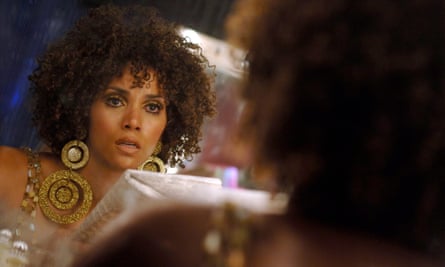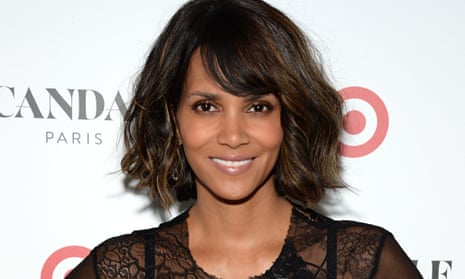Hi Halle. Your film Frankie and Alice, about a woman with a multiple personality disorder, is coming out after having been on the shelf since 2009 (1). Can you even remember making it?
Oh, absolutely. When something is that important to you, and you put your blood, sweat and tears into it, I doubt you’ll ever forget it. My first meeting with Alice (2), the day I got to work with Phylicia Rashad who I just absolutely adored, the day Stellan Skarsgård and I did our first scene together... When people say: ‘there’s no way you’re going to make a little movie about this subject no one cares about’, I think you remember every step of the way.
Is it hard to make this kind of mid-budget film nowadays?
If you have an artistic itch, and there’s a story you want to tell, you go on that journey and do it anyway. And if only five people see it, it’s worth taking the time to make the journey, to do the art. If for no other reason than to get it out of your own system. The value for me wasn’t tied to the box office in any way. These little movies are hard to do, people don’t always want to see them. My feeling of success was from the sheer accomplishment of meeting a woman, being inspired, saying I’m going to make a movie about a dark subject and shedding some light on it. And challenging myself to get it done. That was my reward – to do something I set out to do.

Wasn’t it frustrating to see it languish unreleased?
I would lie if I said it didn’t feel frustrating, but I released the sense of control and said: “You know what, it’ll find its way. And if nobody sees it, well, I did it!”
In terms of producing your own movies, though, were you burnt by the experience?
No, not at all. You win some, you lose some. Some things turn out great, some things are great but don’t get an audience, some things are shit and get a huge audience. You can’t let any of that discourage you, if you’re in this business.
Weren’t you tempted to accept big mainstream hits in the wake of winning your best actress Oscar (3), rather than a tough, heavyweight drama?
If anybody tells you after winning an Oscar they can pick out things that will be hits, they’re lying!
Is it depressing that you’re still the only black female actor to have won it?
I’m disappointed. I’m inspired though, when I see how many people of colour are doing such good work out there. The quality and value of our work isn’t determined by an award. I would like to see more of them recognised, absolutely, but we all need to find the win in the work, and doing our craft. The real win is when we’re not just selling stories of colour, that people of colour can be in everyday stories. Where we’re not saying: “These are the movies for black people.”
There has also been debate about the quality of roles for women over 40. (4)
I’ve always had a hard time getting roles, being of colour, so I’ve got as many available to me as I’ve always had – there’s no difference for me. When I was 21, it was as hard as it is now when I’m 48. For me it’s the same [laughs grimly].
You are starring in and producing Extant with Amazon’s streaming service – is it the case that a lot of the best roles are on TV now?
Anyone in this industry will tell you that that’s where the best writing is. Good actors are going to TV. It’s not just about making movies any more, and movies are becoming harder and harder to make. That taboo of television is long gone. There was a time when movies were [awed whisper] “movies!” But now we have big screens in our homes.
Is there a Frankie and Alice-type passion project you still want to make?
I really would love to one day tell the story of Angela Davis (5). I don’t think she wants a story of her life to be told at this time, and I would never do that without her blessing. But that has always been a passion of mine. She’s just fascinating: the era she lived in, the Black Panthers and all that they stood for, and her connection to it, or not to it. I have a lot of respect for how she lived her life.
Are there lessons from that era of radical black thought that can be applied today?
That was a moment in time never to be recreated – politically it’s a different climate today. I think it’s very important that that time happened, but I’m not so sure that kind of organisation would have much of a place today.
But in the wake of Ferguson, is that kind of political moment rising again?
It might be!
Frankie and Alice is released on DVD on 2 March.
Footnotes
1) She still got nominated for a Golden Globe, despite it only going on release for one week.
2) Frankie Murdoch was a go-go dancer in the 1970s whose disorder had her believing she was a white supremacist; after treatment, she became a successful teacher.
3) For Monster’s Ball in 2002.
4) Russell Crowe recently drew ire talking about “the woman who at 40, 45, 48, still wants to play the ingénue and can’t understand why she’s not being cast as the 21-year-old”.
5) The political activist whom Nixon once described as a “dangerous terrorist” and whom Reagan had barred from university teaching.

Comments (…)
Sign in or create your Guardian account to join the discussion